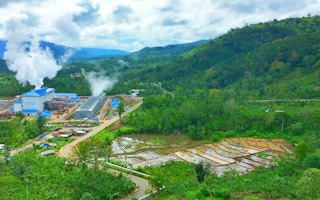As part of its commitment to achieve net-zero emissions (NZE) before 2050, Indonesia aims to obtain 23 per cent of its energy from new and renewable sources by 2025. However, at the end of 2024, the country had reached only 14 per cent of this target. The government has initiated various efforts, notably developing solar power plants across Indonesia, including in Guluk-Guluk and Ketawang Laok villages in Sumenep, Madura, in East Java. Yet this initiative often follows a top-down rather than a bottom-up approach.
While the top-down approach tends to be fast as it is driven by government, large corporations or external agencies, it risks local resistance due to a lack of consultation, community involvement, and ownership, and tends to be technocratically biased. For instance, those implementing programmes may prioritise technical and economic benefits over social and ecological considerations.
Recently, pesantrens (community-based Islamic boarding schools) and communities in Guluk-Guluk held an istighotsah kubro (an Islamic mass prayer gathering) where kyais (religious and pesantren leaders) from renowned pesantrens like Annuqayah, Patapan, and Al Muqri gathered with the villagers to express their objection to the plans for Sumenep.
At first glance, these leaders’ and pesantrens’ opposition to solar power plants may seem paradoxical. For decades, they have been at the forefront of environmental activism, implementing conservation initiatives and promoting ecological education.
A study from 22 July 2024 to 1 February 2025 by the Center for the Study of Islam and Society (PPIM) of Syarif Hidayatullah State Islamic University Jakarta on eco-pesantren Religious Environmentalism Action (REACT) in Indonesia found that Indonesia’s pesantrens have engaged in environmental activism since the 1970s. In the 1990s, these “eco-pesantren movements” led activism against deforestation and actively advocated forest conservation.
While their activism was inspired by Islamic eco-theology, which emphasises the inherent sacredness of nature and Muslims’ responsibility as vice-regents on Earth (khalifah fil ardh) to preserve the environment and maintain ecological balance (mizan), Indonesian pesantrens’ activism was also shaped by concerns over socio-economic inequality that emerged during the New Order era (1966-1998). As institutions deeply embedded in rural communities, pesantrens realised they played a pivotal role in local development.
Environmental activism among pesantrens continues to expand as they discuss Indonesia’s green energy transition. The opposition against renewable energy plants in Sumenep is led by Annuqayah, which according to PPIM’s study has been the most activist pesantren on the environment since the 1970s. Driven to support the local community’s social and economic life, Kyai Basith (then a young kyai) and Shafi’i Anshori (a senior santri) had led various environmental initiatives, including reforestation.
The answer to why pesantrens oppose renewable energy lies not in their rejection of it per se but in their taking an ethical stand against what they consider ecologically and socially unjust development. To them, the solar power projects could threaten the very ecosystems and social fabrics that have long sustained these communities.
The government’s proposed site for the facility is in an area known as the “lungs” of East Guluk-Guluk – a densely forested area with fertile terrain that serves as a major water source and agricultural base. According to a kyai from Annuqayah, this area is vital as it prevents flooding and supports local pesantrens and farmers. Removing around 110 hectares of the forest for solar infrastructure will exacerbate water scarcity, harm livelihoods, and endanger their communities’ long-term survival.
The pesantrens are not anti-renewable energy. Some, such as Pesantren Wali Barokah, have installed rooftop solar panels, making it the pesantren with the biggest such installation among pesantrens in Indonesia. Annuqayah supports installing floating solar panels on dams and unproductive land and using microgrid systems.
These initiatives are technologically viable and consistent with decentralised, community-based sustainability. However, the pesantrens oppose the top-down imposition of renewable energy production, which ignores local wisdom, sacrifices biodiversity, and perpetuates ecological injustice in the name of development.
Beyond ecological concerns, the top-down approach offers minimal economic benefit to the community, as local electricity needs are already fulfilled. The pesantrens’ opposition underscores that pursuing renewable energy unethically or without concern for social justice is “greenwashing” and could replicate the extractive practices that have harmed these communities for decades. The pesantrens’ stance conveys the critical message that a truly sustainable future must be renewable, and socially and economically equitable.
Similar concerns have fuelled resistance to geothermal or clean energy projects in Poco Leok, East Nusa Tenggara and Padarincang, Serang, Banten, where communities fear disruption to climate patterns, water supply, and agricultural land availability. Instead of benefiting the communities, these projects may damage their ecology. A 2020 study by some Canadian scholars showing how geothermal plants may generally harm habitats and pose geological risks supports these local experiences.
As Indonesia advances in its green energy transition, the government must consider ecological and economic justice, which rests on the principles that everything is interconnected and that ethical environmental action is central to social justice, where the people actively participate in decision-making and the sustainable use of energy resources.
The Indonesian government should tighten the regulations for private institutions or companies involved in developing renewable resources. Otherwise, such projects will continue to face strong rejection from society, including pesantrens that are deeply rooted in local communities.
This article was first published in Fulcrum, ISEAS – Yusof Ishak Institute’s blogsite.











